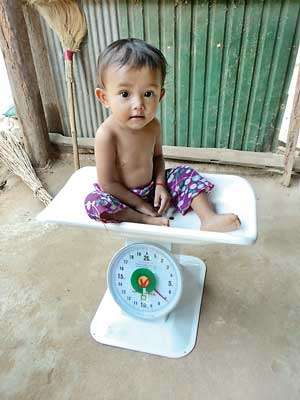Reply To:
Name - Reply Comment

 Growth of a child in the first few years after birth is of crucial importance. This is because any defect in growth, during this period, will have a lasting impact throughout his life. Delaying of growth can be due to multiple causes, many of which are correctable with no lasting harmful effects. That’s of course if they are identified early. In today’s Health Capsule, we have consulted Dr. Deepal Perera, Consultant Paediatrician at Apeksha Hospital Maharagama, regarding growth retardation in young children.
Growth of a child in the first few years after birth is of crucial importance. This is because any defect in growth, during this period, will have a lasting impact throughout his life. Delaying of growth can be due to multiple causes, many of which are correctable with no lasting harmful effects. That’s of course if they are identified early. In today’s Health Capsule, we have consulted Dr. Deepal Perera, Consultant Paediatrician at Apeksha Hospital Maharagama, regarding growth retardation in young children.
Monitoring growth
A child’s weight, height and the circumference of the head are the main determinants of its growth up to the age of two years. After the baby can stand on its own, length is replaced with height in medical calculations. Initially, the weight and the height should be monitored monthly, and in the case of growth retardation, which is usually referred to as failure to thrive, the underlying cause should be investigated in order to take corrective measures. All these values are dotted in the Child Health Development Record (CHDR), and monitored for any slopes in the rate of the child’s growth, explained Dr. Perera.
Malnutrition
Malnutrition is one of the major causes for growth retardation, explained the doctor. This can happen due to deficiency of major or minor nutrients that the body requires. Major nutrients are proteins, carbohydrates and lipids. Minor nutrients are vitamins A, B, C, D, E, K and minerals Iron, Zinc, Calcium and Iodine.
The group of conditions that occur due to the deficiency of major nutrients, especially protein, in childhood, is called Protein - Energy Malnutrition. If there are lower amounts of protein in the body than required, the child usually gets swelling in the body. If the baby doesn’t get adequate calories in the form of carbohydrates or lipids, this will cause muscle wasting as the body will try to produce energy by breaking off muscle proteins. Both of these will impair weight gain, and in some cases there will be loss of weight. If the malnutrition continues for a long time, causing chronic malnutrition, the child may see its height being stunted. This means that he will be short for his age. In the condition called acute chronic malnutrition, where the child is having unresolved malnourishment issues, which lasts for a long duration until the present, both his height and weight will be impaired.
A child’s weight, height and the circumference of the head are the main determinants of its growth up to the age of two years
Other causes
When asked whether malnutrition is the only cause for growth retardation in children, he answered in the negative. He explained that a delay in growth can be due to a variety of underlying factors or a collection of multiple etiologies. Growth retardation in children of less than two years may be due to thyroxin deficiency. This condition, in which the hormone thyroxin, which is a major contributor to a child’s growth and development, is inadequately secreted due to the absence or the malfunction of the thyroid gland since birth, is called congenital hypothyroidism.
After two years, height gain will be affected if the growth hormone is deficient. In any age, iron deficiency can cause growth retardation. Genetic or congenital diseases like Dwarfism, Turner’s syndrome which has abnormal growth and development will naturally have abnormal growth parameters when compared with other children of the same age.
But short stature or reduced weight is not always due to an underlying cause, explained the doctor. Sometimes, the child will be small due to his genetic conditioning. But to come to this conclusion, other underlying causes of growth retardation need to be excluded first.
Mental growth
Another important area that needs attention when it comes to childhood growth and development is the mental growth of a child. Mental retardation can again happen due to nutritional deficiencies like iron deficiency, congenital causes like congenital hypothyroidism and in some genetic disease conditions like Down’s syndrome. Psychological stimulation also plays a crucial role in mental development of a child, stresses the doctor. Parental disharmony, minimized interaction with the child, also can affect a child’s mental growth negatively, he explained.
Maintaining CHDR
In the CHDR, where the child’s growth parameters are charted, there are specific colour coded zones that represent the average weight, height parametres of the general population of that age. When it comes to weight, green zone is the average weight range of the majority of population. Red zone is considered underweight while the purple zone is overweight. Charting is usually done by the Public Health Midwife.
When charting a child’s weight, Dr. Perera advises the parents to seek medical advice if the progression of the chart becomes unusual. For an example, a child suddenly losing weight or not gaining adequate weight after around 6 months of age may be due to some defect in the way of how his complementary feeding is carried out. Certain other chronic illnesses like frequent urinary tract infections, congenital heart disease or poorly controlled asthma or low blood hemoglobin can also cause poor weight gain and sloping of the growth line in the chart. By seeking early medical advice, any underlying cause can be identified early and corrective measures can be taken. Further investigations like FBC, urine cultures, blood thyroxin levels ultrasound scans and CT scans may be needed to confirm the cause.
After two years, height gain will be affected if the growth hormone is deficient. In any age, iron deficiency can cause growth retardation
Over nutrition
Over nutrition can be dangerous too, advises the doctor, stressing that it can lead to health issues like hypertension, diabetes and joint problems later in life, and advises parents to seek medical help in case of children being overweight or obese. Weighting a child at the allocated frequency for the child’s age, maintaining the CHDR, and getting medical help in case of a child not gaining adequate weight or having unexplained loss of weight is very important in maintaining the healthy growth and development of a child, he concluded.